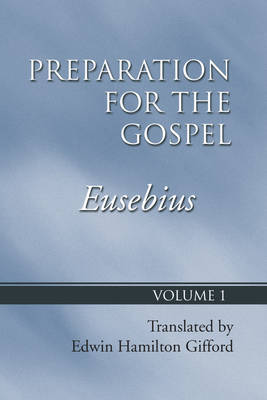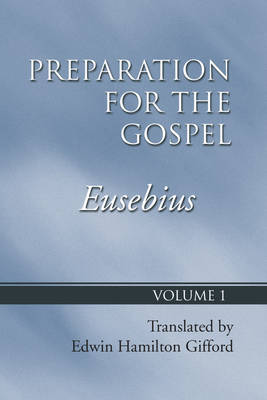
- Retrait gratuit dans votre magasin Club
- 7.000.000 titres dans notre catalogue
- Payer en toute sécurité
- Toujours un magasin près de chez vous
- Retrait gratuit dans votre magasin Club
- 7.000.0000 titres dans notre catalogue
- Payer en toute sécurité
- Toujours un magasin près de chez vous
Description
J. B. Lightfoot ranked Eusebius's Preparation for the Gospel and Proof of the Gospel together as probably the most important apologetic work of the Early church. Eusebius purpose in Preparation for the Gospel to provide brief answers to the questions which may reasonably be put to us both by Greeks and by those of the Circumcision, and by every one who searches with exact inquiry into the opinions held among us. The questions boiled down to two for the Hellenists: Why had Christians abandoned the ancestral religion of the Greeks? and Why had they accepted the foreign doctrines of barbarians (the Jews)? The forcible and true conceptions which [Eusebius's Preparation] exhibits from time to time, more especially bearing on the theme which may be briefly designated 'God in history, ' said Lightfoot, arrest our attention now, and must have impressed his contemporaries still more strongly. Lightfoot concluded that in learning and comprehensiveness this work is without a rival. It begins with a discussion of the myths of pagan theology and their allegorical interpretation. Then Eusebius describes the chief oracles of paganism, its worship of demons, and the opinions of Greek Philosophers on fate and free will. Next he cites the testimony of various authors to the excellency and historical accuracy of the Old Testament. Finally he argues that the Greeks, and especially Plato, borrowed from the older theology of the Jews, and he reveals how Greek philosophers contradicted one another
Spécifications
Parties prenantes
- Auteur(s) :
- Traducteur(s):
- Editeur:
Contenu
- Nombre de pages :
- 960
- Langue:
- Anglais
Caractéristiques
- EAN:
- 9781592440511
- Date de parution :
- 20-09-02
- Format:
- Livre broché
- Format numérique:
- Trade paperback (VS)
- Dimensions :
- 143 mm x 208 mm
- Poids :
- 1102 g

Les avis
Nous publions uniquement les avis qui respectent les conditions requises. Consultez nos conditions pour les avis.






